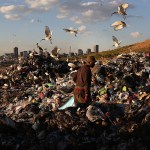GROUNDUP
20 years later government still ‘discussing’ Basic Income Grant with no plan in sight

The Department of Social Development says it will proceed with plans to introduce a new basic income grant, but civil society organisations say they remain sceptical that government has the political will to introduce a grant any time soon.
First published by GroundUp.
In her budget vote speech last month, Minister of Social Development Lindiwe Zulu said that the need to introduce a basic income grant has become an “urgent consideration” for national government.
Zulu said that the Department of Social Development (DSD) “has developed a Basic Income Grant (BIG) discussion document” and was starting consultations “targeted at developing the BIG financing mechanism for the unemployed population group that is aged 19 to 59 years”.
In November 2020, the DSD invited civil society organisations to make submissions on its discussion document which would then be presented to cabinet.
When GroundUp requested the revised document, DSD spokesperson Lumka Oliphant said “when the document is ready for public consumption, it will be shared with everyone”.
In October 2020, the Black Sash launched a petition demanding the government introduce a grant of R1,268 for unemployed citizens between 18 and 59 years. The petition was endorsed by over 80 organisations.
Hoodah Abrahams-Fayker, of the Black Sash, said the organisation saw the discussion paper as a positive step, but the government has been considering the implementation of BIG since 2002 (when the Taylor Commission considered it, and it was discussed in Parliament).
“Almost 20 years later, this issue has still not moved beyond a discussion,” she said. “No time frames have been given for when this process will be completed.
“Given the immediate humanitarian crisis and the Covid-19 third wave, it is imperative that government reinstates the Covid-19 Social Relief of Distress (SRD) Grant indefinitely until such a policy [BIG] is in place,” said Abrahams-Fayker.
She said civil society organisations are urging government to develop a policy framework and to secure a budget for the phased-in implementation of permanent Basic Income Support by 1 April 2022, for those aged 18 to 59 years who have little to no income.
National Economic Development and Labour Council (Nedlac) executive director Lisa Seftel said that its social security task team has investigated the feasibility of BIG and submitted its research along with the DSD’s draft discussion document.
“Once the Department of Social Development has published a policy document for public comments, the proposals will also be tabled at Nedlac for social partners to consider,” said Seftel.
Speaking at a webinar about the termination of the R350 Covid-19 Social Relief of Distress Grant, July Eccles of the #PayTheGrants campaign said that “the overwhelming feeling on the ground” remains sceptical about government’s political will to establish an income support grant.
Organisations affiliated with the campaign had previously sent letters of request to meet with government in January, February and April 2021 to discuss the implementation of BIG. Despite follow up requests to secure a date for the meeting, they have not received a response.
“People are really tired of empty promises from political parties,” said Eccles. “Overwhelmingly, people are aware that a lot of this is used as political football, similarly to the promise of job creation,” she said.
Eccles said, “The DSD is open to the conversation, but every time they come back to us they tell us they cannot extend the grant or look at BIG because Treasury has given them a limited budget … But we can’t have a conversation about balancing the books when people are desperate.”
Responding to a written parliamentary question from the Democratic Alliance, Zulu said that the DSD currently has a social assistance budget of R190-billion, from which more than 18 million South Africans are receiving grants.
“Over the past 20 years, the budget has been kept constant at around 3% of the national gross domestic product (GDP), thus staying more or less in line with the economic performance of the country,” said Zulu.
According to a Bloomberg report, the ANC previously proposed paying a R500 monthly grant to people aged 19 to 59, and it would cost the state R197.8 billion a year.
National Treasury replied to GroundUp that the requests made by civil society groups were “sent to several departments including National Treasury” and that “government will respond in due course”. DM


















 Become an Insider
Become an Insider
Madam, there will come a day, when those that you shame with your grants will realise that their vote is worth more
Another article that simply ignores the reality we are facing in South Africa.
“But we can’t have a conversation about balancing the books when people are desperate.”
South Africa is on a fiscal cliff…this is not about “balancing books”. This is about the governments complete and utter failure and corruption over 20 years. This is about an overtaxed shrinking tax base that cannot support the whole country even if they tried. This is about billions wasted by the ANC.
Just today in the news 26 billion wasted or stolen as reported by the AG. If these problems are not fixed first, our economy will collapse, if BIG is implemented at that point it would definitely stop along with just about any service delivery, health system and education. And we haven’t even factored in the impact of the NHI and EWC.
We need a solution to this, no question about it, but we do have to work with what we got and we have to name the guilty that are primarily at fault that such an income grant is literally impossible at the moment. Not because we are playing a blame game or scoring political points, but because we can only change when we identify the correct reasons why we are where we are.
We are where we are now because people were made to believe they are entitled to grants, houses, free everything, yet we still want to do more of what has proven disastrous?
I could never understand the supposed dignity one gets from getting something they didn’t work for, as per these intellectual’s defence for taking what others rightfully earn and giving it to those that don’t?
Maybe it is karma just balancing the books that makes sure that those content to get without working, after using tax to extort from those that work for their money, stay where they should, in perpetual poverty, until they learn to work for what they earn. Immorality has a price, even if it skips a generation or 2, karma will balance the books eventually.